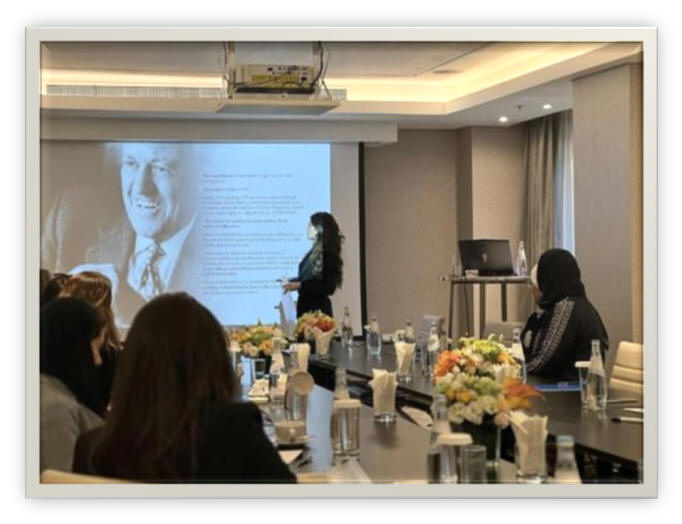 |


|
 |
You studied international etiquette and diplomatic
protocol; do you encourage teenagers to study etiquette or take courses?
Please explain the benefits of studying etiquette?
Of course, I do! As an advocate of etiquette I highly encourage them to take
a course of etiquette as teenagers. The skills and knowledge they will
acquire and use afterwards will benefit them throughout their lives. Recent
studies show that “85% of professional success is based on your
interpersonal skills, and only 15% on your technical skills”.
Etiquette is not only about “forks and knives”, etiquette also empowers you
with skills to make you stand out: pleasant character, high self-esteem and
high self- confidence, learn to read body language, understand people from
different cultures, be respectful and be respected, know what to wear for
different occasions, and of course dining etiquette.
Do you follow the rules of etiquette in your
everyday life? And does it become a habit?
Yes, I do. It became a way of life. Let’s keep in mind that I still like to
let go sometimes but always being respectful and kind.
Updates us on your foundation Etiquette Touch, is
there new courses that have been added since our last interview?
We still have our 3 major Programs: Business Etiquette, Social Etiquette and
Youth Etiquette.
We have added:
Under the Business Etiquette Program:
• Cross-Cultural Awareness training
• Build your executive wardrobe
• How to ace your job interview
Under Social Etiquette & Youth Etiquette:
• Know your style
• Walk with confidence
• Bridal Etiquette
Our courses our trainings always change and are tailored to adapt to the
requirements of our clients.
What social functions does etiquette serve?
My answer to this question is very simple and direct.
Etiquette allows you to minimize misunderstanding and miscommunications that
can lead to confrontation or conflict.
How? By facilitating respectful interactions, enhancing relationships, and
promoting cultural understanding and inclusively.
What are the most important rules of etiquette?
• To be considerate and empathetic
• To be respectful
• To be confident
• To be kind
• To be punctual
• And of course, to know your table manners
Can having good manners help you become successful
and why?
Your manners speak louder than your words and actions. As I said above,
having good manners with good technical skills will surely open more doors
for you and be more successful. Successful in your professional life BUT
also in your social life (friends, family, acquaintances…).
Do some cultures care more about etiquette than
others?
To start with, each country has its own etiquette. Some countries emphasize more on following the social etiquette rules and
traditions more than others. Other countries have a more relaxed way of life.
Example: Japan and South Korea have a strong emphasis on following the
strict rules of etiquette in their country. USA, on the other hand does not put much emphasis on formal etiquette, they
have less rigid social protocol.
If anyone is traveling for leisure or for work, I always advise to read
about the country and understand the way social interactions and business
are done there.
What are some manners from the past that are rarely
or never practiced anymore?
• To send handwritten
Thank-you notes letters, invitations or even greetings.
• To stand when a woman enters the room: Men used to stand as a form of
respect for the lady.
• To stand when an elderly person enters the room
• Calling people older than you by using Mr. or Mrs. Now it is very common
for teenagers to call their parents, family members, or even adults with
their first name directly. This was considered very poor manners, rude &
impolite.
• To know how to navigate easily a complex formal table setup
• To wait for everyone to be served before starting to eat.
• To respect allocated places for older people that shows respect and
consideration.
I can still go on but that’s a main idea of how these simple acts of respect
are “vanishing” due to modernization. However, these manners if done will always reflect the values of respect,
consideration, and politeness that will certainly help in social
interactions.
Is (ladies first) a polite idea that still work
nowadays? Should men do things for women like pull out their chairs at a
dinner table or wait for them to go through a door first?
This is a very controversial topic nowadays.
Personally, I admire seeing some chivalry from gentlemen: like helping me
put on my coat, open the door for me, filling my glass when it gets empty.
I always appreciate the thought and effort when a gentleman pulls out a
chair for the lady or opens the door for her in a social context. In today’s
world, it is important to handle these gestures with sensitivity and
consideration of the lady’s preferences. Some ladies will appreciate these
gestures and feel special, other ladies would prefer to handle these actions
themselves. Remember to always assess the context of the situation: social or business
context.
What are some examples of impolite behavior that
you have noticed between teenagers? And how etiquette can solve this
problem?
Being sarcastic, rude, and nonchalant are some of the most unpleasant
behaviors I see in teenagers. Also interrupting conversations, using
electronic devices inappropriately and being badly dressed.
Etiquette will give them all the tools they need to express themselves, to
express their thoughts and their opinion in a polite way which will
eventually lead to better communication and better outcome for them without
the need for confrontation.
In addition, etiquette will show them how their behavior can have a powerful
impact on others.
What is good etiquette when driving in general? Is
it rude to honk your horn?
I will take this opportunity to remind the readers about the Driving
Etiquette rules:
• Fasten your seatbelt
• Stay in your lane
• Do not use your phone (use it for directions only)
• Respect the speed limit (left lane for maximum speed limit and right lane
for slower drivers)
• Use the blinkers even when changing lanes
• Do not curse
• Respect pedestrians
• Do not honk in residential areas
Yes, honking is considered rude. Honking should be reserved for situations
where it is necessary to alert other drivers of a potential danger/accident
or be used in a polite & non-aggressive way.
Excessive honking can lead to stress other drivers hence increase the
chances of accidents.
What are some good table manners?
• Know your utensils and place settings.
• Eat slowly.
• Chew with your mouth closed.
• Do not be loud.
• If sharing a dish, do not use your fork or spoon to take from the main
plate.
• If you do not like the food, do not make any facial expressions.
This is just a brief list. During the dining etiquette course, we cover all the dos and don’ts and of
course at the end of the course the participants will master their table
manners.
We know that taking pictures in restaurants and
shops is impolite? What if someone took your picture without asking how you
should react?
It has become a trend unfortunately. If you
wish to take a picture, you may ask the people you are with if it’s ok with
them and then you need to take their consent for publishing it on social
media.
As for the second part of your question:
If you have taken a picture and there is someone who doesn’t want to be in
the picture, there are 2 options:
1. Delete it and retake the picture without this person
2. Or, you can crop the person out if possible, or hide all the person with
a sticker.
When visiting someone's home? How would you try to
be a good visitor? Also, we see many teenagers and even adults holding their
phones all the time while visiting relatives and friends. As a host what
should you do?
Being a good guest starts from the
entrance:
• Smiling and greeting the host politely. By host, I mean your friend and
their family.
• It’s always considerate to take something with you. A cake, flowers/plant,
decorative item, or even a homemade item.
• If the guest is not expecting an urgent call or an important call, it’s
good manners to keep your phone in your bag or facing down- not in silent
mode.
• For teenagers, try to enjoy the time with your friend(s) by not using the
phone. There are many board games that are fun and challenging. This will
boost your bonding and create everlasting memories.
• Do not be very demanding when being offered food or drinks.
• Always say thank you when leaving your friend’s house.
As a host:
• make sure to make feel your guest at ease- example: if they fall a glass
water, control your reaction, and just say: it’s ok, it happens a lot with
us & always with a smile ☺
• If you know there are 2 people who don’t get along, try not to invite them
at the same time to keep the atmosphere and ambience smooth.
• Ask your guests about allergies related to food or pets.
• Do not be in a rush for another appointment; this will make your guest
feel unwelcome.
What is the etiquette of attending a party? What
advice would you give teenagers at a birthday party or any other
celebration?
• Arrive on time
• Bring a gift for the host
• Say hello to everyone and specially greet the birthday girl/boy or the
host/hostess.
• If you see your group of friends, it’s normal to stay with them but do not
gossip and always remember not to leave the host feeling left-out.
• Do not comment negatively about the party, always say thank you with a
smile.
• Practice your positive body language and your positive facial expression.
• Enjoy your time and have fun but always in a respectful & polite way.
Many people spend hours daily on social media,
especially teenagers, what are the etiquette rules for using social media?
And what things should be avoided?
• Always be respectful and considerate on social media.
• Comment positively and genuinely
• No cyber bullying
• Leave your negative and rude comments to yourself.
• Do not over share personal information (for your own safety mainly)
• Be mindful that anything you post on social media can potentially be used
against you in the future (by your interviewers, people can screenshot your
post...)
• Avoid spreading false information
• Respect privacy of others
What the negative effects of social media on
teenagers regarding etiquette and manners?
The negative effects of social media on teenagers' etiquette and manners
include:
• Decreased face-to-face communication skills,
• Cyber bullying
• Lack of empathy due to lack of direct communication
• Impulsive and inappropriate posting
• Reduced awareness of social cues to lack of face-to-face social
interactions
• Lack of attention spam
• Distraction and time management issues
• The pressure to fit in, meet certain expectations & conform to certain
standards of behavior, appearance & lifestyle.
Examples: to have this new fashion item, have this facial routine, wear
something that doesn’t suit you because everyone is, be rude with someone
because it’s “cool”, etc…
What would you do if someone was staring at you and
you felt uncomfortable?
1. Assess the situation: Take a
moment to determine if the person is staring intentionally or just a
misunderstanding. One simple quick powerful look (1-2 seconds maximum) in
the direction of this person can make you understand the person’s intention.
2. Seek a safe space: if the staring continues and still makes you feel
uncomfortable, try to change your place, go to a more public area or go to
your friends or people you can trust who are around you.
3. Talk to someone you trust: If the staring still continues and makes you
feel unsafe, consider speaking to a trusted adult- who can have an authority
on this person. This can be: a parent, a teacher or another responsible
person (the manager of the restaurant/cafe) for guidance and support.
4. Trust your instincts! If you still feel the situation is making you more
uncomfortable and unsafe, ask for help directly. But always stay in public
areas- with friends if possible. You can even call the police if you feel
the need.
5. Be assertive: If you feel comfortable, safe and strong enough to address
this person staring at you- you can say: but this needs practice to be
assertive and polite. For example, you might say: "I noticed you've been
staring at me, and it's making me uncomfortable. Is there something you
need?” You need to practice saying this in a polite but assertive way.
How to be assertive is part of our etiquette training.
How to react when someone interrupts your speech?
First and most importantly: Remain calm and composed. DO NOT REACT WITH
FRUSTRATION OR ANGER.
I would suggest you listen calmly then say politely something like this:
“I understand your point, but if I may finish my thought first, then get
back to you.”
In this way you have asserted yourself respectfully and maintained control
of the conversation in a very positive & mature way.
What are some ideas that can make teenagers
interested in etiquette and what your advice for teenagers in general?
Taking a course, workshop, or training in etiquette will empower teenagers
with essential lifetime skills that they will use throughout their lives.
These skills will enable them to navigate social and professional situations
with confidence, respect, and consideration for others.
I will give some examples of how etiquette training will help in:
• Professional Development: Learning proper etiquette can help teenagers
develop essential professional skills, such as effective communication,
networking, and professional behavior. These skills are valuable for future
job interviews, internships, and career opportunities.
• Respect and Consideration: Etiquette training teaches teenagers the
importance of these values which are essential for building relationships in
both personal and professional settings.
• Dining Etiquette: Knowing how to conduct oneself at the dining table can
make a positive impression and enhance their confidence in various social
settings.
• Cultural Awareness: Etiquette classes will help teenagers understand and
appreciate the differences & similarities among people from different
cultural backgrounds. This encourages respect for diversity and promotes
inclusively in their interactions with others.
Finally, by learning proper etiquette, teenagers can empower themselves to
make positive impressions, build strong relationships, and conduct
themselves with grace and professionalism in any personal and professional
setting.
|
 |


|





